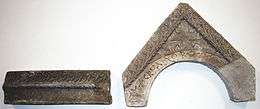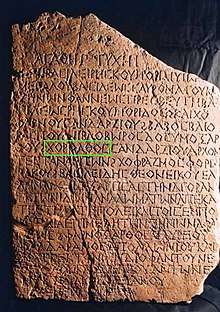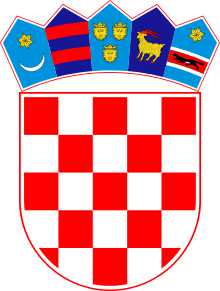Names of the Croats and Croatia
The name of Croatia (Croatian: Hrvatska) derives from Medieval Latin Croātia, itself a derivation of the native ethnonym of Croats, earlier Xъrvatъ and modern-day Croatian: Hrvati.
Earliest record

Although in 2005 it was archaeologically confirmed that the ethnonym Croatorum is mentioned in a church inscription found in Bijaći near Trogir dated to the end of the 8th or early 9th century,[1] it is generally accepted that the first attestation of the ethnonym is in the Latin charter of Duke Trpimir from 852, the original of which has been lost. A copy has been preserved in a 1568 transcript; Lujo Margetić proposed in 2002 that the document is in fact of legislative character, dating to 840.[2] In it is mentioned:
- Dux Chroatorum iuvatus munere divino […] Regnum Chroatorum
The presumably oldest stone inscription is the Latin Branimir Inscription (found in Šopot near Benkovac), where Duke Branimir (879–892) is mentioned:
- BRANIMIRO COM […] DUX CRVATORVM COGIT […]
The monument with the earliest writing in the Croatian language containing the ethnonym xъrvatъ (IPA: [xŭrvaːtŭ]) is the Baška tablet from 1100, which reads: zvъnъmirъ kralъ xrъvatъskъ ("Zvonimir, king of Croats").[3]
Etymology

The exact origin and meaning of the ethnonym, in singular, Hrvat (Proto-Slavic *Xъrvátъ,[4][5] or *Xhruwāte[6]) is poorly known and still subject to scientific disagreement.[7] It is believed that the word might not be of native Slavic lexical stock, but a borrowing.[8][9] Common theories from the 20th century derive it from an Iranian origin,[6] the root word being a third-century Scytho-Sarmatian form attested in the Tanais Tablets as Χοροάθος (Khoroáthos, alternate forms comprise Khoróatos and Khoroúathos).[3]
This form was used to substantiate the derivation of Proto-Slavic *xъrvatъ from the Old Persian xaraxwat-, attested by the Old Iranian toponym Harahvait-, the native name of Arachosia.[5] "Arachosia" is the Latinized form of Ancient Greek Ἀραχωσία (Arachosíā); in Old Persian inscriptions, the region is referred to as Harahuvatiš (![]()
![]()
![]()
![]()
![]()
![]()
![]()
The first etymological thesis about the name of the Croats stems from Constantine Porphyrogennetos (tenth century), who connected the different names of the Croats, Βελοχρωβάτοι and Χρωβάτοι (Belokhrobatoi and Khrobatoi), with the Greek word χώρα (khṓra, "land"): "Croats in Slavic language means those who have many lands". In the 13th century, Thomas the Archdeacon considered that it was connected with the name of inhabitants of the Krk isle, which he gave as Curetes, Curibantes. In the 17th century, Juraj Ratkaj found a reflexion of the verb hrvati (se) "to wrestle" in the name.[12]
In the 19th century, many different derivations were proposed for the Croatian ethnonym:
- Josef Dobrovský believed it to be linked to the root *hrev "tree", whereas Johann Kaspar Zeuss linked it to *haru "sword";
- S. Mikucki connected it with Old-Indian šarv- "strike";
- Pavel Jozef Šafárik derived it from xrъbъtъ, xribъtъ, xribъ "ridge, highlanders", whereas Franz Miklosich said it derived from hrъv (hrŭv) "dance";
- Đ. Daničić considered its root to be *sar- "guard, protect";
- L. Geitler considered that the Lithuanian words šárvas "armor" and šarvúotas "cuirassier" might be related to the ethnonym;
- Fyodor A. Braun saw the German Harfada (Harvaða fjöllum from Hervarar saga ok Heiðreks), which would be the German name of the Carpathian Mountains, as the origin of an intermediate form Harvata;
- Rudolf Much connected it to a Proto-Germanic word hruvat- "horned", or – and Z. Gołąb proposed – "warriors clad with horn-armor", as a self-designation;[13]
- H. H. Howorth,[14] J. B. Bury,[15] Henri Grégoire,[16] considered that it derives from the personal name of Kubrat, the leader of the Bulgars and founder of Old Great Bulgaria.
The 20th century gave rise to many new theories regarding the origin of the name of the Croats:
- A. I. Sobolevski derived it from the Iranian words hu- "good", ravah- "space, freedom" and suffix -at-;
- G. A. Ilyinsky derived it from *kher- "cut", as seen in the Greek word kárkharos "sharp", kharah "tough, sharp", and xorbrъ "brave";
- Hermann Hirt saw a connection with the name of a Germanic tribe Harudes (Χαροῦδες);
- A. Bruckner linked it to Slovak charbati se "to oppose" or via skъrv-/xъrv- to the Lithuanian šárvas "armor";
- K. Oštir considered valid a connection with an unspecified Thraco-Illyrian word xъrvata- "hill";
- Max Vasmer first considered it as a loanword from Old-Iranian, haurvatā "shepherd" (Avestan haurvaiti means "pasturage"), later also from Old-Iranian hu-urvatha- "friend" (also accepted by N. Zupanič).[12]
- Zupanič additionally proposed Lezgian origin from Xhurava (community) and plural suffix -th, meaning "municipalities, communities".[17]
- M. Budimir saw in the name a reflexion of Indo-European *skwos "gray, grayish", which in Lithuanian gives širvas;
- S. K. Sakač linked it with the Avestan name Harahvaitī, which once signified the southwestern part of modern Afghanistan, the province Arachosia.[4]
- G. Vernadsky considered a connection to the Chorasmí from Khwarezm,[18] while F. Dvornik a link to the Krevatades or Krevatas located in the Caucasus mentioned in the De Ceremoniis (tenth century).[18]
- V. Miller saw in the Croatian name the Iranian hvar- "sun" and va- "bed", while P. Tedesco had a similar interpretation from Iranian huravant "sunny";
- O. Kronsteiner suggested it might be derived from Tatar-Bashkir *chr "free" and *vata "to fight, to wage war".[4]
From the theses the most widely accepted is the derivation by Oleg Trubachyov from *xar-va(n)t (feminine, rich in women, ruled by women), which derives from the etymology of Sarmatians name,[19][6] the Indo-Aryan *sar-ma(n)t "feminine", in both Indo-Iranian adjective suffix -ma(n)t/wa(n)t, and Indo-Aryan and the Indo-Iranian *sar- "woman", which in Iranian gives *har-.[19] According to Radoslav Katičić this thesis doesn't entirely fit with the Croatian ethnonym, as the original form was Hrъvate not Hъrvate,[20] and the vowel "a" in the Iranian harvat- is short, while in the Slavic Hrъvate it is long.[21] Katičić concluded that of all the etymological considerations the Iranian is the least unlikely.[21][22][7] Ranko Matasović also considered it of Iranian origin.[6]
The Medieval Latin name "Croātia" is derived from North-West Slavic xrovat-, by liquid metathesis from Common Slavic *xorvat-, from Proto-Slavic, i. e. Iranian, *xarwāt-.[23] The Croatian ethnonym Hrvat in the Kajkavian dialect also appears in the form Horvat, while in the Chakavian dialect in the form Harvat.[24]
Distribution
Croatian place names can be found in northern Slavic regions such as Moravia and Slovakia, along the river Saale in Germany, in Austria and Slovenia, and in the south in Greece and Albania.[25]
Thus in the Duchy of Carinthia one can find Hrvatski kotar and Chrowat along upper Mura;[26] in Middle Ages the following place names have been recorded: Krobathen, Krottendorf, Krautkogel;[26] Kraut (before Chrowat and Croat) near Spittal.[26] In the Duchy of Styria there are toponyms such as Chraberstorf and Krawerspach near Murau, Chrawat near Laas in Judendorf, Chrowat, Kchrawathof and Krawabten near Leoben.[26][27] Along middle Mura Krawerseck, Krowot near Weiz, Krobothen near Stainz and Krobathen near Straganz.[26][28]
In Slovenia there are Hrovate and Hrovača;[26] in Germany along Saale river there were Chruuati near Halle) in 901 AD, Chruuati in 981 AD,[29] Chruazis in 1012 AD,[29] Churbate in 1055 AD,[29] Grawat in 1086 AD,[29] Curewate (now Korbetha), Großkorbetha (Curuvadi and Curuuuati 881-899 AD) and Kleinkorbetha,[29] and Korbetha west of Leipzig;[26][30][4] In Moravia are Charwath[31] or Charvaty near Olomouc, in Slovakia are Chorvaty and Chrovátice near Varadka.[26] The Charvatynia near Kashubians in district Neustadt is debatable.[31]
In the southern Balkans, North Macedonia has a place named Arvati (Арвати) situated near lower Prespa;[26] in Greece there is a Charváti (Χαρβάτι) in Attica and Harvation in Argolis, as well as Charváta (Χαρβάτα) on Crete;[26][30] and Hirvati in Albania.[26]
References
Notes
- "Kulturna kronika: Dvanaest hrvatskih stoljeća". Vijenac (in Croatian). Zagreb: Matica hrvatska (291). 28 April 2005. Retrieved 10 June 2019.
- Antić, Sandra-Viktorija (November 22, 2002). "Fascinantno pitanje europske povijesti" [Fascinating question of European history]. Vjesnik (in Croatian).
- Gluhak 1990, p. 131.
- Gluhak 1990, p. 130.
- Gluhak 1993.
- Matasović 2008, p. 44.
- Budak 2018, pp. 98.
- Gluhak 1990, p. 130–134.
- Gluhak 1993, p. 270.
- "The same region appears in the Avestan Vidēvdāt (1.12) under the indigenous dialect form Haraxvaitī- (whose -axva- is typical non-Avestan)."Schmitt, Rüdiger (1987), "Arachosia", Encyclopædia Iranica, 2, New York: Routledge & Kegan Paul, pp. 246–247
- Katičić 1999, p. 12.
- Gluhak 1990, p. 129f..
- Gluhak 1990, p. 129.
- Howorth, H. H. (1882). "The Spread of the Slaves - Part IV: The Bulgarians". The Journal of the Anthropological Institute of Great Britain and Ireland. 11: 224.
It was a frequent custom With the Hunnic hordes to take their names from some noted leader, and it is therefore exceedingly probable that on their great outbreak the followers of Kubrat should have called themselves Kubrati, that is, Croats.I have argued in a previous paper of this series that the Croats or Khrobati of Croatia were so called from a leader named Kubrat or Khrubat. I would add here an addition to what I have there said, viz., that the native name of the Croats, given variously as Hr-wati, Horwati, cannot surely be a derivative of Khrebet, a mountain chain, as often urged, but is clearly the same as the well known man’s name Horvath, familiar to the readers of Hungarian history and no doubt the equivalent of the Khrubat or Kubrat of the Byzantine writers, which name is given by them not only to the stem father of the Bulgarian kings, but to one of the five brothers Who led the Croat migration
- Bury, J. B. (1889). A History of the later Roman empire from Arcadius to Irene (395-800). II. p. 275.
- Alexandru Madgearu; Martin Gordon (2008). The Wars of the Balkan Peninsula: Their Medieval Origins. Scarecrow Press. p. 157. ISBN 978-0-8108-5846-6.
Henri Gregoire has tried to identify this Chrovatos with Kuvrat, the ruler of the Protobulgarians who rebelled against the Avars, recorded by other sources in the first third of the seventh century. As a matter of fact, now it is certain that Kuvrat lived in the North-Pontic steppes, not in Pannonia. He was the father of Asparuch, the ruler of the Protobulgarian group that immigrated to Moesia. Chrovatos was an invented eponym hero, like other such mythical ancestors of the European peoples.
- Sakač, Stjepan K. (1937), "O kavkasko-iranskom podrijetlu Hrvata" [About Caucasus-Iranian origin of Croats], Renewed Life (in Croatian), Zagreb: Filozofski institut Družbe Isusove, 18 (1)
- Marčinko 2000, p. 184.
- Gluhak 1990, p. 131f..
- Gluhak 1990, p. 229.
- Katičić 1999, p. 11.
- Marčinko 2000, p. 193.
- Gluhak 1990, p. 95.
- Velagić, Zoran (1997), "Razvoj hrvatskog etnonima na sjevernohrvatskim prostorima ranog novovjekovlja" [Development of the Croatian ethnonym in the Northern-Croatian territories of the early modern period], Migration and Ethnic Themes (in Croatian), Bjelovar, 3 (1–2): 54
- Goldstein 2003.
- Gračanin 2006, p. 85.
- Marčinko 2000, p. 181.
- Marčinko 2000, p. 181-182.
- Marčinko 2000, p. 183.
- Vasmer 1941.
- Marčinko 2000, p. 182.
Sources
- Vasmer, Max (1941), Die Slaven in Griechenland [The Slavs in Greece] (in German), Berlin: Verlag der Akademie der Wissenschaften
- Gołąb, Zbigniew (1990), The Origins of the Slavs: A Linguist's View., Columbus: Slavica, ISBN 978-0-89357-231-0
- Gluhak, Alemko (1990), Podrijetlo imena Hrvat [Origin of the name Croat] (in Croatian), Zagreb: Jezik (Croatian Philological Society), pp. 128–135
- Gluhak, Alemko (1990), Porijeklo imena Hrvat [Origin of the name Croat] (in Croatian), Zagreb, Čakovec: Alemko Gluhak
- Gluhak, Alemko (1993), Hrvatski etimološki rječnik [Croatian etymological dictionary] (in Croatian), Zagreb: August Cesarec, ISBN 953-162-000-8
- Katičić, Radoslav (1999), Na kroatističkim raskrižjima [At Croatist intersections] (in Croatian), Zagreb: Hrvatski studiji, ISBN 953-6682-06-0
- Marčinko, Mato (2000), "Tragovi i podrijetlo imena Hrvat" [Traces and the origin of Croatian name], Indoiransko podrijetlo Hrvata [Indo-Iranian origin of Croats] (in Croatian), Naklada Jurčić, ISBN 953-6462-33-8
- Goldstein, Ivo (2003), Hrvatska povijest [Croatian history] (in Croatian), Zagreb: Novi Liber, ISBN 953-6045-22-2
- Gračanin, Hrvoje (2006), Kratka povijest Hrvatske za mlade I. - od starog vijeka do kraja 18. stoljeća [Short history of Croatia for youth I. - from the old age till the end of 18th century] (in Croatian), Zagreb: Sysprint, ISBN 953-232-111-X
- Matasović, Ranko (2008), Poredbenopovijesna gramatika hrvatskoga jezika [A Comparative and Historical Grammar of Croatian] (in Croatian), Zagreb: Matica hrvatska, ISBN 978-953-150-840-7
- Budak, Neven (2018), Hrvatska povijest od 550. do 1100. [Croatian history from 550 until 1100] (in Croatian), Leykam international, pp. 86–118, ISBN 978-953-340-061-7CS1 maint: ref=harv (link)
Further reading
| Look up Croatia in Wiktionary, the free dictionary. |
